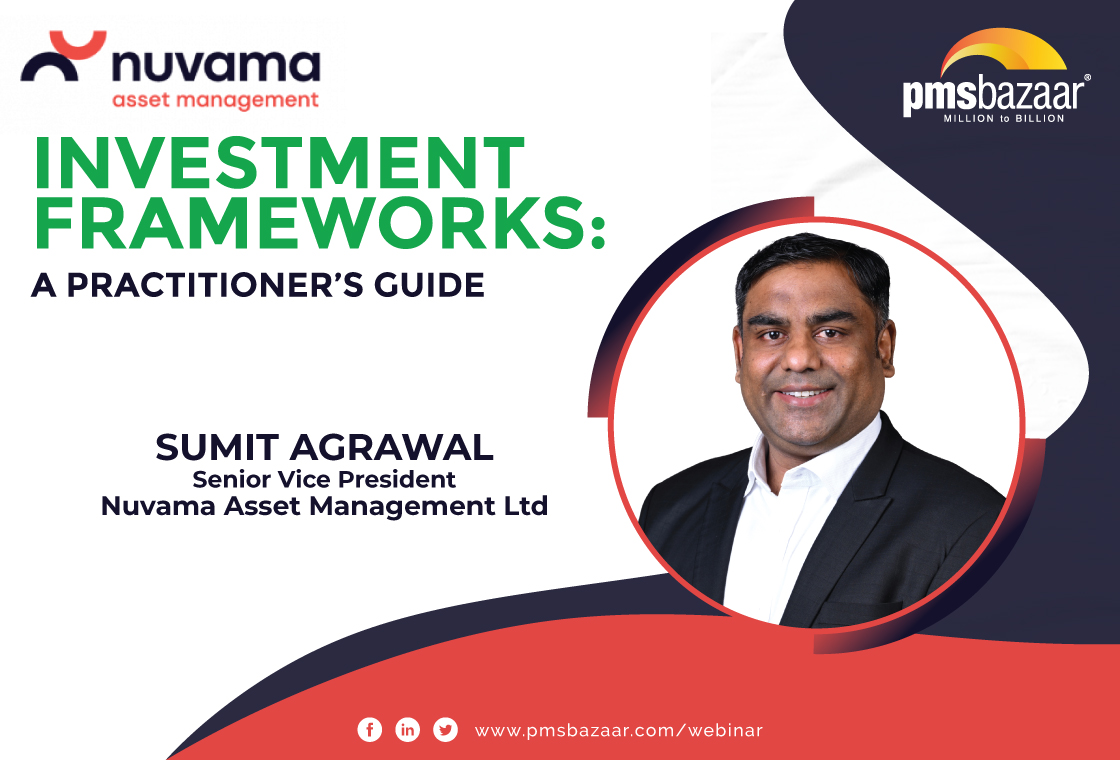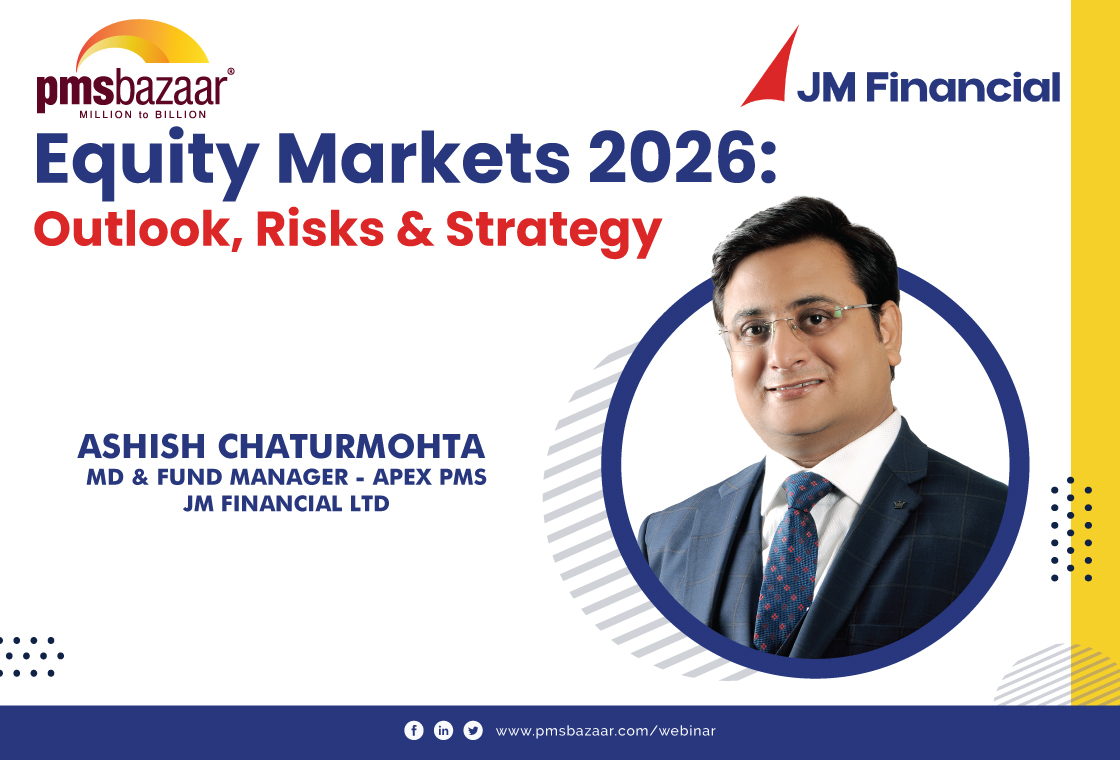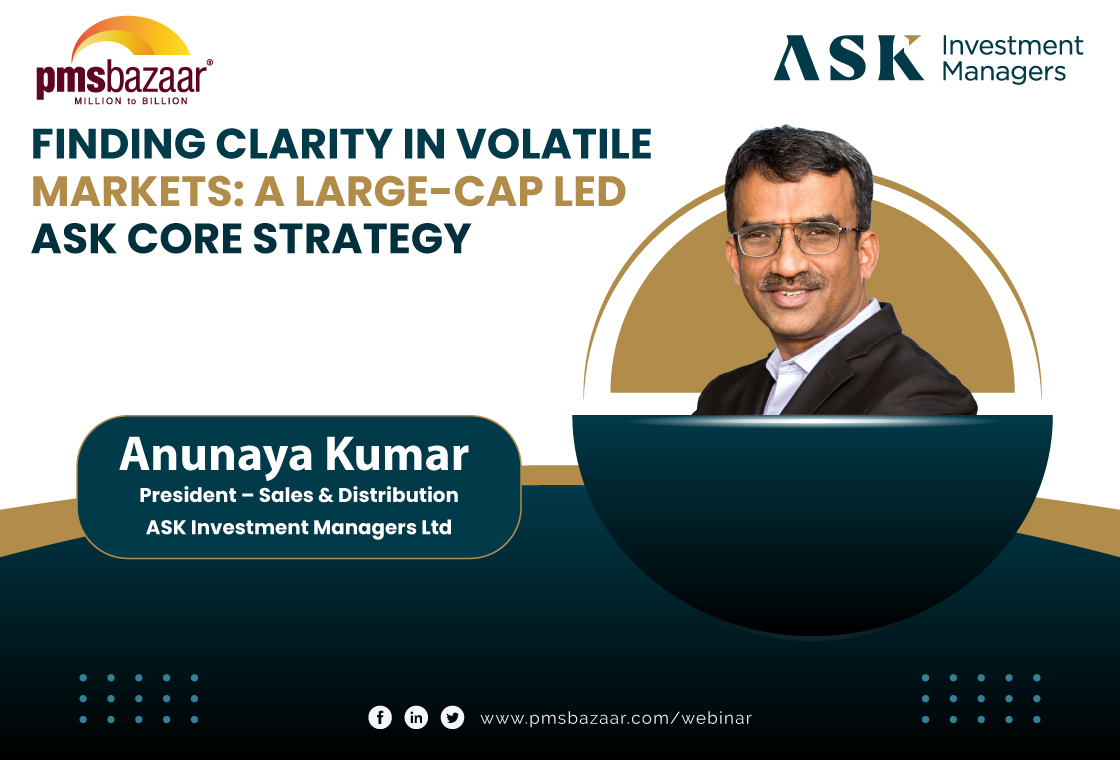For the better part of this year, we've been inundated with doom and gloom headlines, bouncing stock prices, and economic indicators that depict a less than rosy image. Any of these factors could lead us to consider selling our investments and avoiding more risk to our "nest egg." It's natural to worry about your finances on days when headlines and market changes are unsettling. But, it's more important than ever to resist emotional, panic-driven decisions and focus on the wider picture of your long-term goals.

In this very interesting backdrop, PMS Bazaar held a webinar “Navigating the market volatility”. The keynote speaker is Mr. Rajesh Kothari, Founder & Managing Director, AlfAccurate Advisors Pvt Ltd.
Mr. Rajesh Kothari is the visionary Founder & Managing Director of AlfAccurate Advisors & the driving force behind making AAA one of India’s most respected, award-winning investment management firms. With 25+ years of rich experience in the Indian capital market, and as a dynamic and result-oriented leader, he brings to the table keen analysis, sharp insights, and a results-oriented approach to drive high returns.
Key inputs and insights concerning the above topic as given by Mr. Rajesh Kothari covered in this webinar blog are:
- What is happening in the market now
- How to avoid common pitfalls
- Importance of sticking to your financial plan
- What one should do right now
What’s Happening in the Market Now?
There have been numerous times in history when stock markets have declined, yet these periods are usually followed by the most favorable returns. People, unfortunately, remember the bad twice as much as the good. This means that, despite the world's longest bull market, a few bad days in the markets can prompt investors to reconsider their long-term investment strategy.
We can't say that markets will always bounce back since we can't anticipate the future. If you look at how markets have performed in the past, you'll discover that they have always rebounded. This is how markets work; they have ups and downs, and as an investor, you must learn to deal with them.
Market declines can be upsetting, but if you respond by selling your investments, you risk jeopardizing your investment strategy and missing out on some fantastic opportunities. It might be worth continuing with your investments for a few years if you want to smooth out the bumps while taking advantage of the good periods. The longer you invest, the more likely you are to succeed.
How do avoid common pitfalls?
Whenever an event occurs, whether it is coverage, a supply chain shock, a surge in oil prices, or a Russia-Ukraine situation, three crucial elements must be considered. Interest rates on inflation and these two factors must be considered together. However, there are a few myths about inflation.
Inflation is not too bad. For instance, 2003 to 2006 was the golden period of the Indian bull market, when the stock market increased five times in five years. And at that period, inflation increased, and as inflation increased, corporate profits increased profit, and when corporate profit increased, so did market profit.
However, if the interest rate or inflation rises above a certain point, It is a dangerous indicator when it crosses the 8%-90% time percent mark. Then corporate property GDP drops, and the stock market drops as well. So while moderate inflation is good, hyperinflation is not good for the market.
The next most common concern among investors: what if the Fed raises interest rates significantly higher than expected? From 2004 to 2006, when Fed increased rates NIFTY delivered 95% returns. So, it is not necessary that when Fed rates are up, the market also gets affected. However negative interest rates can affect the markets.
According to Mr. Rajesh Kothari “If the interest rate rises to a certain level, it means the economy is growing, and as the economy grows, demand improves, and as demand improves, credit growth improves, and as credit growth improves, there is more demand for loans, and as there is more demand for loans, the interest rate rises”. So rise in interest and inflation implies an improvement in demand, which is why the market is rising.
Importance of sticking to your financial plan
“During volatile times, it can seem (really) appealing to change how you invest in hopes of a better return. First, accept market volatility — which is relatively common — as a normal part of the process of investing and the best way to outrun inflation”, says Mr. Rajesh Kothari. Embrace the volatility, because it’s why investors are getting paid to own stocks.
This means investors should stay calm even through extreme movements. Even though stocks have gyrated in recent months, long-term market returns are still based on the same factors. In addition, sharp moves down can also be opportunities to buy more stocks and set yourself up for future gains. Emotions can help influence decision-making, but when it comes to considering investment decisions in a volatile market, following your emotions too closely may point your investments in the wrong direction.
Review your financial plan and determine if you’re still comfortable with it. If you don’t have one, take the time to establish one. Base decisions on your long-term goals. That goal will determine your asset allocation strategy and time horizon.
Your financial plan and investment strategy should account for normal market volatility, so turn off the news and focus on the long term. Be sure to check in on the progress in your portfolio at least annually and review your plan whenever you have a major change in your life.
What one should do right now?
First, take advantage of market volatility. Second, time in the market is more important than timing the market. People will say things like "I sold at the peak and bought at the bottom." This only happens in stories; in real life, it doesn't work that way.
Third, invest consistently even during bad times. Don't worry about withdrawing if you are following a systematic investment plan or if you have a financial goal. Six months, nine months, etc., do not focus on peak-based investment.
Last but not least, finally, but certainly not least, consider it a hands-off approach if you are competent to do your own investments, and if you are not able to, take the help of a financial advisor like PMS Bazaar or any other good advisors or fund managers.
Mr. Rajesh Kothari covered all the above-mentioned topics in-depth and also answered some questions from the audience towards the end of the session. He also gave suggestions on how AAA can help investors during market volatility. To know all of that watch the recording of this insightful session through the appended link below:
Get access to rich data and analytics of PMS & AIF by subscribing to us. Join the 35000+ investors & experts now: Subscribe NOW
Recent Blogs

January Rout, Extreme Dispersion: PMS Returns Swing From Losses to Gains
Benchmark falls deepened losses, but multi-asset and debt cushioned portfolios meaningfully

Investment Frameworks : A Practitioner’s Guide
PMS Bazaar recently organized a webinar titled “Investment Frameworks: A Practitioner’s Guide,” which featured Mr. Sumit Agrawal, Senior Vice President, Nuvama Asset Management Limited. This blog covers the important points shared in this insightful webinar.

Aurum Multiplier Portfolio - Where Small and Mid-Cap Alpha Meets Large-Cap Stability
PMS Bazaar recently organized a webinar titled “Aurum Multiplier Portfolio - Where Small and Mid-Cap Alpha Meets Large-Cap Stability,” which featured Mr. Sandeep Daga, MD& CIO, Nine Rivers Capital and Mr. Kunal Sabnis, Portfolio Manager, Nine Rivers Capital. This blog covers the important points shared in this insightful webinar.

Flat Markets, Wide Outcomes: How 484 PMS Strategies Performed in Dec 2025
December 2025 was a month where market returns stayed close to flat, with the Nifty 50 TRI at -0.28% and the BSE 500 TRI at -0.24%.

Equity Markets 2026: Outlook, Risks and Strategy
PMS Bazaar recently organized a webinar titled “Equity Markets 2026: Outlook, Risks and Strategy,” which featured Mr. Ashish Chaturmohta, MD & Fund Manager – APEX PMS, JM Financial Limited. This blog covers the important points shared in this insightful webinar.

MICRO CAPS: The Dark Horses of the Indian Equity Market
PMS Bazaar recently organized a webinar titled “MICRO CAPS: The Dark Horses of the Indian Equity Market,” which featured Mr. Rishi Agarwal and Mr. Adheesh Kabra, both Co-Founders and Fund Managers, Aarth AIF. This blog covers the important points shared in this insightful webinar.

Finding Clarity in Volatile Markets: A Large-Cap Led ASK CORE Strategy
PMS Bazaar recently organized a webinar titled “Finding Clarity in Volatile Markets: A Large-Cap Led ASK CORE Strategy,” which featured Mr.Anunaya Kumar, President – Sales and Distribution ASK Investment Managers Limited. This blog covers the important points shared in this insightful webinar.
.jpg)
Passively Active Investing — A Modern Investor’s Lens on ETF-Based PMS
PMS Bazaar recently organized a webinar titled “Passively Active Investing — A Modern Investor’s Lens on ETF-Based PMS,” which featured Mr. Karan Bhatia, Co-Founder and Co-Fund Manager , Pricebridge Honeycomb ETF PMs. This blog covers the important points shared in this insightful webinar.

